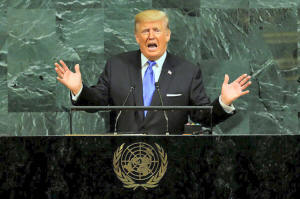|
Despite undiplomatic discourse, Trump's
dance card is full
 Send a link to a friend
Send a link to a friend
 [September 23, 2017]
By Arshad Mohammed and Michelle Nichols [September 23, 2017]
By Arshad Mohammed and Michelle Nichols
UNITED NATIONS (Reuters) - A subtle
diplomat like Talleyrand, Donald Trump is not.
The U.S. president, in his first foray at the U.N. General Assembly,
derided North Korean leader Kim Jong Un as a "rocket man ... on a
suicide mission" and delivered an unabashed defense of sovereignty at
the seat of global multilateralism.
But if his speech drew barbs from allies and authoritarian adversaries,
it did nothing to deter his dance partners at the premier diplomatic
waltz of the year, the 193-member United Nations' annual gathering of
world leaders known by the acronym UNGA.
Trump held bilateral meetings with 13 leaders this week, more than his
predecessor Barack Obama had at his first UNGA(five), his last (six) or
his busiest (10), according to data compiled by CBS News White House
correspondent Mark Knoller.

Trump's less than diplomatic speech on Tuesday recalled the fiery
nationalist language of his Jan. 20 inaugural address and raised
eyebrows across the political spectrum by its bald assertion of the
primacy of U.S. interests.
"Our government's first duty is to its people, to our citizens - to
serve their needs, to ensure their safety, to preserve their rights, and
to defend their values," he said, evoking his campaign's nationalist
themes despite the departure of advocates such as Steve Bannon from the
White House.
Germany's foreign minister, Sigmar Gabriel, delivered a riposte in a
scathing and barely veiled critique on Thursday.
"National egoism, I believe, is worthless as a regulatory principle for
our world," Gabriel said. "The motto 'our country first' not only leads
to more national confrontations and less prosperity, in the end there
can only be losers."
Robert Mugabe, Zimbabwe's authoritarian 93-year-old leader who has ruled
the former British colony since independence in 1980, also sought to
nudge Trump in a more peaceable direction.
"Mr. Trump, please blow your trumpet, blow your trumpet in a musical way
towards the values of unity, peace, cooperation, togetherness,
dialogue," he said.
In his speech, Trump said if the United States were forced to defend
itself or its allies, it would have "no choice but to totally destroy
North Korea" and he called Iran's government a "murderous regime" that
exports "violence, bloodshed and chaos."

His directness contrasts with the subtlety of 18th- and 19th-century
French diplomat Charles-Maurice de Talleyrand, who is reputed to have
said: "A diplomat who says 'yes' means 'maybe,' a diplomat who says
'maybe' means 'no,' and a diplomat who says 'no' is no diplomat."
Still, Trump's language has seeped into the discourse of other leaders,
perhaps seeking to curry his favor.
[to top of second column] |

President Donald Trump addresses the 72nd United Nations General
Assembly at U.N. headquarters in New York, U.S., September 19, 2017.
REUTERS/Lucas Jackson

Palestinian President Mahmoud Abbas spoke of "draining the swamp" of
Israeli occupation while South Korean President Moon Jae-in called
North Korean behavior "extremely deplorable."
Trump, possibly recalling the criticism that his Democratic U.S.
presidential opponent Hillary Clinton earned for calling some of his
supporters a "basket of deplorables," was pleased.
"I'm very happy that you used the word 'deplorable'," Trump told
Moon. "That's been a very lucky word for me and many millions of
people."
Both Moon and Abbas had sitdowns with Trump, and there was no
shortage of others who wanted to meet him.
A U.S. official said the White House accommodated as many requests
for meetings as they could schedule, noting some leaders who wanted
to meet Trump did not make the cut. The U.S. president has also
wanted to see the leaders of China, India and Germany, but they did
not come this year.
Afghan President Ashraf Ghani met Trump on Thursday, and officials
in Kabul said all the impetus had come from the Afghan side, with no
burning interest from the White House.
French President Emmanuel Macron made clear he would work with any
U.S. president, whoever he was, and said he and Trump had clear
disagreements on climate change and Iran policy.
"I want a deep, cordial dialogue to bring him back into the
international and multilateral fold on these two subjects," Macron
told reporters. "As I'm a pragmatist, I put myself in a position to
work the best way possible with him."

Asked if dealing with Trump was like managing a difficult child, the
French president replied: "Not at all. I'm managing a partner of the
world's biggest power and a historical partner for our country."
(Reporting by Yara Bayoumy, Anthony Boadle, David Brunnstrom,
Rodrigo Campos, Parisa Hafezi, Steve Holland, John Irish, Jeff
Mason, Arshad Mohammed and Michelle Nichols at the United Nations
and James Mackenzie in Kabul; Writing by Arshad Mohammed; Editing by
James Dalgleish)
[© 2017 Thomson Reuters. All rights
reserved.]
Copyright 2017 Reuters. All rights reserved. This material may not be published,
broadcast, rewritten or redistributed.
 |